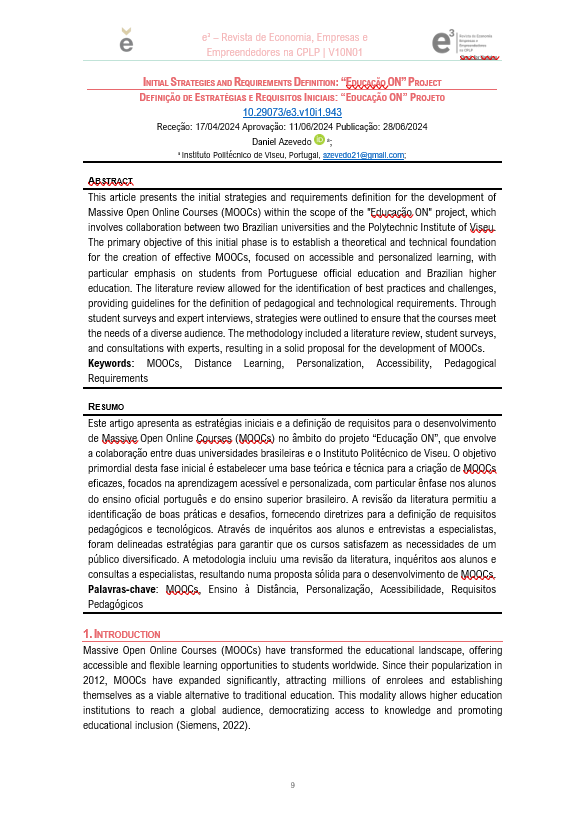DEFINIÇÃO DE ESTRATÉGIAS E REQUISITOS INICIAIS: “EDUCAÇÃO ON” PROJETO
Main Article Content
Resumo
Este artigo apresenta as estratégias iniciais e a definição de requisitos para o desenvolvimento de Massive Open Online Courses (MOOCs) no âmbito do projeto “Educação ON”, que envolve a colaboração entre duas universidades brasileiras e o Instituto Politécnico de Viseu. O objetivo primordial desta fase inicial é estabelecer uma base teórica e técnica para a criação de MOOCs eficazes, focados na aprendizagem acessível e personalizada, com particular ênfase nos alunos do ensino oficial português e do ensino superior brasileiro. A revisão da literatura permitiu a identificação de boas práticas e desafios, fornecendo diretrizes para a definição de requisitos pedagógicos e tecnológicos. Através de inquéritos aos alunos e entrevistas a especialistas, foram delineadas estratégias para garantir que os cursos satisfazem as necessidades de um público diversificado. A metodologia incluiu uma revisão da literatura, inquéritos aos alunos e consultas a especialistas, resultando numa proposta sólida para o desenvolvimento de MOOCs
Downloads
Article Details

Este trabalho encontra-se publicado com a Licença Internacional Creative Commons Atribuição 4.0.
Referências
Allen, M. (2020). SAM: Successive Approximation Model. Association for Educational Communications & Technology.
Bransford, J. D., Brown, A. L., & Cocking, R. R. (2000). How people learn: Brain, mind, experience, and school. National Academy Press.
Branch, R. M. (2019). Instructional design: The ADDIE approach. Springer.
Brusilovsky, P. (2020). User models for adaptive educational systems. In R. B. Kinshuk & C. D. K. Lin (Eds.), Adaptive educational technologies for literacy instruction (pp. 29-53). Springer.
Deci, E. L., Ryan, R. M., Vallerand, R. J., & Pelletier, L. G. (1991). Motivation and education: The self-determination perspective. Educational Psychologist, 26(3-4), 325-346.
Deci, E. L., & Ryan, R. M. (2019). The "What" and "Why" of goal pursuits: Human needs and the self-determination of behavior. Psychological Inquiry, 30(4), 227-268.
Deterding, S., Dixon, D., Khaled, R., & Nacke, L. (2018). From game design elements to gamefulness: Defining "gamification". Proceedings of the 15th International Academic MindTrek Conference, 9-15.
Freeman, S., Eddy, S. L., McDonough, M., Smith, M. K., Okoroafor, N., Jordt, H., & Wenderoth, M. P. (2014). Active learning increases student performance in science, engineering, and mathematics. Proceedings of the National Academy of Sciences, 111(23), 8410-8415.
Garrison, D. R., Anderson, T., & Archer, W. (2019). Critical thinking, cognitive presence, and computer conferencing in distance education. American Journal of Distance Education, 15(1), 7-23.
Hamari, J., Koivisto, J., & Sarsa, H. (2014). Does gamification work? A literature review of empirical studies on gamification. Proceedings of the 47th Hawaii International Conference on System Sciences, 3025-3034.
Holmes, W., Bialik, M., & Fadel, C. (2019). Artificial intelligence in education: Promises and implications for teaching and learning. Center for Curriculum Redesign.
Keller, J. M. (1987). Development and use of the ARCS model of instructional design. Journal of Instructional Development, 10(3), 2-10.
Keller, J. M. (2019). Motivational design for learning and performance: The ARCS model approach. Springer.
Koller, D., Ng, A., Do, C., & Chen, Z. (2011). Retention and intention in massive open online courses: In depth. EDUCAUSE Review, 6(1), 62-64.
Kraut, R., Patterson, M., Lundmark, V., Kiesler, S., Mukhopadhyay, T., & Scherlis, W. (2002). Internet paradox: A social technology that reduces social involvement and psychological well-being? American Psychologist, 53(9), 1017-1031.
Luckin, R., Holmes, W., Griffiths, M., & Forcier, L. B. (2018). Intelligence unleashed: An argument for AI in education. Pearson.
Mayer, R. E. (2009). Multimedia learning (2nd ed.). Cambridge University Press.
Molenda, M. (2003). In search of the elusive ADDIE model. Performance Improvement, 42(5), 34-37.
Papastergiou, M. (2018). Digital game-based learning in high school computer science education: Impact on educational effectiveness and student motivation. Computers & Education, 59(2), 611-622.
Reich, J. (2015). MOOCs and completion rates: What do we know? Journal of Online Learning and Teaching, 11(1), 134-145.
Siemens, G. (2022). Massive open online courses: Expanding access to higher education. Athabasca University Press.
Voigt, P., & Von dem Bussche, A. (2017). The EU General Data Protection Regulation (GDPR): A practical guide. Springer.
Yuan, L., & Powell, S. (2013). MOOCs and open education: Implications for higher education. JISC CETIS. https://www.jisc.ac.uk
Zhang, D., Zhao, J. L., Zhou, L., & Nunamaker Jr, J. F. (2019). Can e-learning replace classroom learning? An empirical study of MOOC-based blended learning. Information & Management, 56(3), 103-114.





